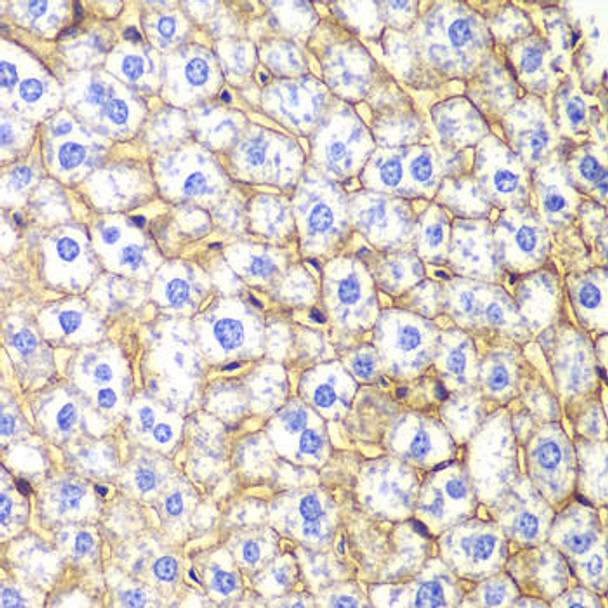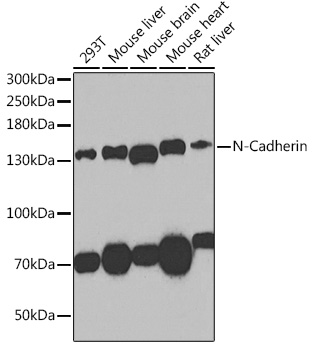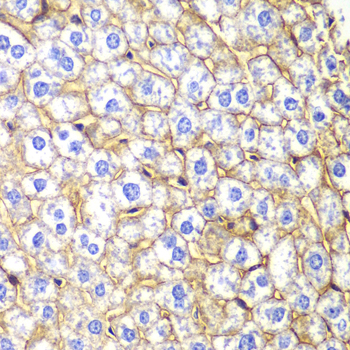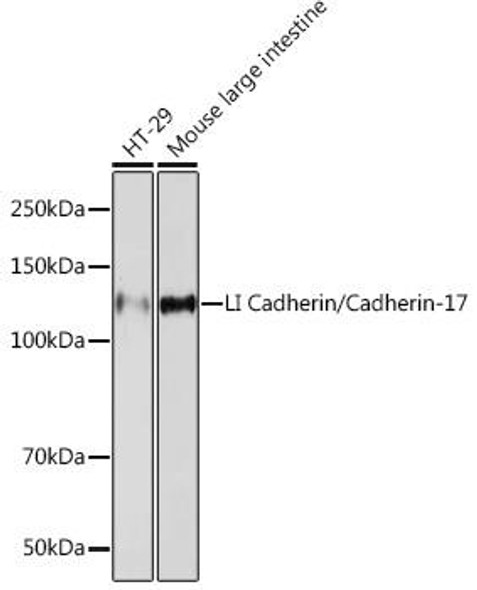N-Cadherin Antibody (CAB0433)
- SKU:
- CAB0433
- Product Type:
- Antibody
- Reactivity:
- Human
- Mouse
- Rat
- Host Species:
- Rabbit
- Isotype:
- IgG
- Antibody Type:
- Polyclonal Antibody
- Research Area:
- Cell Biology
Description
Anti-N-Cadherin Antibody (CAB0433)
The CDH2 Polyclonal Antibody (CAB0433) is a versatile tool for researchers studying CDH2, a cell adhesion protein also known as N-Cadherin. This antibody, produced in rabbits, is highly specific for human samples and has been validated for use in Western blot applications. By binding to the CDH2 protein, this antibody enables accurate detection and analysis in a variety of cell types, making it well-suited for investigations in cell biology, developmental biology, and cancer research.
CDH2 is a key player in cell-cell adhesion and is involved in diverse biological processes such as tissue morphogenesis, cell migration, and neuronal development. Dysregulation of CDH2 expression has been associated with several diseases, including cancer metastasis and cardiovascular disorders. Studying the function and regulation of CDH2 with this antibody can provide valuable insights into these pathologies and potential therapeutic targets for intervention.
| Antibody Name: | Anti-N-Cadherin Antibody |
| Antibody SKU: | CAB0433 |
| Antibody Size: | 20uL, 50uL, 100uL |
| Application: | WB IHC |
| Reactivity: | Human, Mouse, Rat |
| Host Species: | Rabbit |
| Immunogen: | A synthetic peptide corresponding to a sequence within amino acids 750-850 of human N-Cadherin (NP_001783.2). |
| Application: | WB IHC |
| Recommended Dilution: | WB 1:500 - 1:2000 IHC 1:50 - 1:100 |
| Reactivity: | Human, Mouse, Rat |
| Positive Samples: | 293T, Mouse liver, Mouse brain, Mouse heart, Rat liver |
| Immunogen: | A synthetic peptide corresponding to a sequence within amino acids 750-850 of human N-Cadherin (NP_001783.2). |
| Purification Method: | Affinity purification |
| Storage Buffer: | Store at -20'C. Avoid freeze / thaw cycles. Buffer: PBS with 0.02% sodium azide, 50% glycerol, pH7.3. |
| Isotype: | IgG |
| Sequence: | DKER QAKQ LLID PEDD VRDN ILKY DEEG GGEE DQDY DLSQ LQQP DTVE PDAI KPVG IRRM DERP IHAE PQYP VRSA APHP GDIG DFIN EGLK AADN DPTA P |
| Gene ID: | 1000 |
| Uniprot: | P19022 |
| Cellular Location: | Cell membrane, Single-pass type I membrane protein |
| Calculated MW: | 97kDa/99kDa |
| Observed MW: | 140kDa |
| Synonyms: | CD325, CDHN, CDw325, NCAD, N Cadherin, CDH2 |
| Background: | This gene encodes a classical cadherin and member of the cadherin superfamily. Alternative splicing results in multiple transcript variants, at least one of which encodes a preproprotein is proteolytically processed to generate a calcium-dependent cell adhesion molecule and glycoprotein. This protein plays a role in the establishment of left-right asymmetry, development of the nervous system and the formation of cartilage and bone. |
| UniProt Protein Function: | CDH2: Cadherins are calcium dependent cell adhesion proteins. They preferentially interact with themselves in a homophilic manner in connecting cells; cadherins may thus contribute to the sorting of heterogeneous cell types. CDH2 may be involved in neuronal recognition mechanism. In hippocampal neurons, may regulate dendritic spine density. Interacts with CDCP1. Identified in a complex containing FGFR4, NCAM1, CDH2, PLCG1, FRS2, SRC, SHC1, GAP43 and CTTN. Interacts with PCDH8; this complex may also include TAOK2. The interaction with PCDH8 may lead to internalization through TAOK2/p38 MAPK pathway. |
| UniProt Protein Details: | Protein type:Membrane protein, integral; Cell adhesion; Motility/polarity/chemotaxis Chromosomal Location of Human Ortholog: 18q11.2 Cellular Component: cell-cell adherens junction; focal adhesion; lamellipodium; apical plasma membrane; integral to membrane; plasma membrane; synapse; catenin complex; intercellular junction; fascia adherens Molecular Function:protein binding; gamma-catenin binding; beta-catenin binding; calcium ion binding; protein phosphatase binding; alpha-catenin binding Biological Process: heterophilic cell adhesion; intercellular junction assembly and maintenance; muscle cell differentiation; cell migration; glial cell differentiation; positive regulation of MAPKKK cascade; calcium-dependent cell-cell adhesion; blood vessel morphogenesis; positive regulation of muscle cell differentiation; striated muscle cell differentiation; cell adhesion; homophilic cell adhesion |
| NCBI Summary: | This gene is a classical cadherin from the cadherin superfamily. The encoded protein is a calcium dependent cell-cell adhesion glycoprotein comprised of five extracellular cadherin repeats, a transmembrane region and a highly conserved cytoplasmic tail. The protein functions during gastrulation and is required for establishment of left-right asymmetry. At certain central nervous system synapses, presynaptic to postsynaptic adhesion is mediated at least in part by this gene product. [provided by RefSeq, Jul 2008] |
| UniProt Code: | P19022 |
| NCBI GenInfo Identifier: | 116241277 |
| NCBI Gene ID: | 1000 |
| NCBI Accession: | P19022.4 |
| UniProt Secondary Accession: | P19022,Q14923, Q8N173, A8MWK3, B0YIY6, |
| UniProt Related Accession: | P19022 |
| Molecular Weight: | 97,040 Da |
| NCBI Full Name: | Cadherin-2 |
| NCBI Synonym Full Names: | cadherin 2, type 1, N-cadherin (neuronal) |
| NCBI Official Symbol: | CDH2 |
| NCBI Official Synonym Symbols: | CDHN; NCAD; CD325; CDw325 |
| NCBI Protein Information: | cadherin-2; N-cadherin 1; neural cadherin; neural-cadherin; cadherin 2, N-cadherin (neuronal); calcium-dependent adhesion protein, neuronal |
| UniProt Protein Name: | Cadherin-2 |
| UniProt Synonym Protein Names: | CDw325; Neural cadherin; N-cadherin; CD_antigen: CD325 |
| Protein Family: | Cadherin |
| UniProt Gene Name: | CDH2 |
| UniProt Entry Name: | CADH2_HUMAN |












